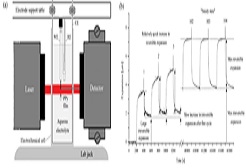Daniel Melling
University of Dundee, UK
Title: The development of smart materials for medical applications using laser scanning micrometry
Biography
Biography: Daniel Melling
Abstract
Smart-materials based on conducting polymers (CPs) such as polypyrrole (PPy) are currently being used to develop micro-actuators for cell biology applications, such as the electrical and mechanical stimulation of stem cells. Such materials must be capable of long term, stable actuation in within biological fluids and cell culture media. Unfortunately, devices employing CPs are often demonstrated over a relatively small number of cycles, during which time any deterioration in their behavior is not always evident. For example CP films based on PPy (DBS) typically display a large decrease in performance when actuated over several days actuated in saline solutions. This can be attributed to the loss of unbound oligomer and dedoping of counter ions from within the polymer film. There is clearly a need to develop CP films that can be actuated within biological fluids and cell culture media with little deterioration of performance during the lifetime of the device. We have employed a relatively new approach, Laser Scanning Micrometry (LSM), to characterize the electrochemomechanical behavior of actuating CP films based on PPy. The films have been synthesized over a range of different conditions and actuated in biologically relevant conditions. Our aim has been to improve the actuation performance of CP films when actuated over long periods of time (days) in aqueous based electrolytes that model biological fluids. We will describe how we have used LSM to implement synthetic strategies and develop new CP materials for the production of actuating films with improved long term performance. In this respect, LSM has proven to be a valuable tool for the study, characterization and development of CP actuating films.

Recent Publications
- Melling D, Wilson S A, Jager E W H (2015) Controlling the electro-mechanical performance of polypyrrole through 3- and 3, 4-methyl substituted copolymers. RSC Advances, 5: 84153-84163.
- Melling D, Wilson S, Jager E W H (2013) The effect of film thickness on polypyrrole actuation assessed using novel non-contact strain measurements. Smart Materials and Structures, 22.
- Melling, D., Wilson, S., Berggren, M., Jager, E. W. H. (2011) Altering the structure of polypyrrole and the influence on electrodynamic performance. Electroactive Polymer Actuators and Devices (EAPAD), Proc. Of SPIE, Vol. 7976, Art. No. 79760Z, DOI: 10.1117/12.880277.
- Melling D, Jager E W H (2016) Conducting Polymers as EAPs: Characterisation Methods and Metrics. Electromechanically Active Polymers: A Concise Reference (Polymers and Polymeric Composites: A Reference Series), Publisher: Springer, pp.740, DOI: 10.1007/978-3-319-31767-0_14-1.
- Gursel Alici, Rahim Mutlu, Melling D, Keiichi Kaneto, Jager E W H (2016) Conducting Polymers as EAPs: Device Configurations. Electromechanically Active Polymers: A Concise Reference (Polymers and Polymeric Composites: A Reference Series), Publisher: Springer, p1-35, DOI: 10.1007/978-3-319-31767-0_12-1.

